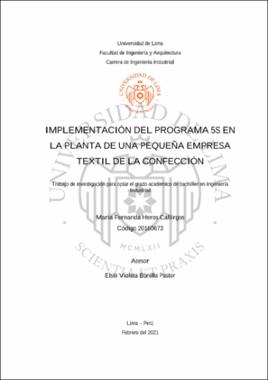Mostrar el registro sencillo del ítem
Implementación del programa 5S en la planta de una pequeña empresa textil de la confección
| dc.contributor.advisor | Bonilla Pastor de Céspedes, Elsie | |
| dc.contributor.author | Heros Callirgos, Maria Fernanda | |
| dc.date.accessioned | 2021-03-18T01:57:05Z | |
| dc.date.available | 2021-03-18T01:57:05Z | |
| dc.date.issued | 2021 | |
| dc.identifier.citation | Heros Callirgos, M. F. (2021). Implementación del programa 5S en la planta de una pequeña empresa textil de la confección [Trabajo de Investigación para optar el grado de Bachiller en Ingeniería Industrial, Universidad de Lima]. Repositorio institucional de la Universidad de Lima. https://hdl.handle.net/20.500.12724/12755 | es_PE |
| dc.identifier.uri | https://hdl.handle.net/20.500.12724/12755 | |
| dc.description.abstract | This research responds to the problem generated by waste in the production of clothing in small textile companies in Lima. That is, it is proposed to increase productivity from the reduction of excess waste, reprocesses, defectives and keep the job in order, without neglecting safety through the Lean implementation of 5S, which consists of 5 stages: eliminate , order, clean, standardize and discipline. The implementation of the 5s program will bring economic, social and technological benefits to productivity in textile microenterprises, costs will be reduced and continuous improvement will be promoted. Therefore, the results will be measurable through indicators that go hand in hand with the objective of continuous improvement. This work will mainly use secondary sources. The chosen sources are characterized by being related to the main theme, that is, they speak of the implementation of the Lean methodology in the textile sector. The main characteristics they have is that they touch on topics of textile manufacturing, lean methodology, 5S, and that they are not too old to have a good reference. In addition, by comparing indicators, it will seek to expose the reasons for the importance and effectiveness of implementing the 5S Methodology in the textile industry. Some of the results are the reduction of waste, reprocessing and downtime, which lead to a reduction in costs. | en_EN |
| dc.description.abstract | La presente investigación da respuesta a la problemática generada por los desperdicios en la producción de prendas de vestir en las pequeñas empresas textiles de Lima. Es decir, se propone incrementar la productividad a partir de la disminución del exceso de mermas, reprocesos, defectuosos y mantener ordenado el puesto de trabajo, sin descuidar la seguridad a través de la implementación Lean de 5S, la cual consiste en 5 etapas: eliminar, ordenar, limpiar, estandarizar y disciplina. La implementación del programa 5s traerá consigo beneficios económicos, sociales y tecnológicos a la productividad en las microempresas textiles, se reducirán costos y se promoverá la mejora continua. Por ello, los resultados serán medibles a través de indicadores que van de la mano con el objetivo de mejora continua. Este trabajo utilizará, principalmente, fuentes secundarias. Las fuentes escogidas se caracterizan por tener relación con el tema principal, es decir, hablan de la implementación de la metodología Lean en el sector textil. Las características principales que tienen es que tocan temas de confección textil, metodología lean, 5S, y que no sean muy antiguas para tener una buena referencia. Además, mediante la comparación de indicadores, se buscará exponer las razones de la importancia y efectividad de implementar la Metodología 5S en la industria textil. Alguno de los resultados son la reducción de mermas, reprocesos y de tiempo improductivo, los cuales, conllevan en una disminución en los costos. | es_PE |
| dc.description.uri | Trabajo de investigación | |
| dc.format | application/pdf | |
| dc.language.iso | spa | |
| dc.publisher | Universidad de Lima | |
| dc.rights | info:eu-repo/semantics/openAccess | * |
| dc.rights.uri | https://creativecommons.org/licenses/by-nc-sa/4.0/ | * |
| dc.source | Repositorio Institucional - Ulima | |
| dc.source | Universidad de Lima | |
| dc.subject | Manufacturing processes | en_EN |
| dc.subject | Process control | en_EN |
| dc.subject | Textile industry | en_EN |
| dc.subject | Procesos de manufactura | es_PE |
| dc.subject | Control de procesos | es_PE |
| dc.subject | Industria textil | es_PE |
| dc.title | Implementación del programa 5S en la planta de una pequeña empresa textil de la confección | es_PE |
| dc.type | info:eu-repo/semantics/bachelorThesis | |
| thesis.degree.level | Bachiller | |
| thesis.degree.discipline | Ingeniería Industrial | es_PE |
| thesis.degree.grantor | Universidad de Lima. Facultad de Ingeniería y Arquitectura | |
| dc.publisher.country | PE | |
| dc.type.other | Trabajo de investigación | |
| thesis.degree.name | Bachiller en Ingeniería Industrial | |
| renati.advisor.orcid | https://orcid.org/0000-0001-6430-1935 | |
| renati.discipline | 722026 | |
| dc.identifier.isni | 0000000121541816 | |
| renati.author.dni | 74130097 | |
| renati.level | https://purl.org/pe-repo/renati/level#bachiller | * |
| renati.advisor.dni | 9879442 | |
| renati.juror | Noriega-Aranibar, María-Teresa | |
| renati.juror | Cabrera-Gil-Grados, Ezilda | |
| renati.juror | Hernandez-Gorritti, Wilfredo | |
| renati.type | https://purl.org/pe-repo/renati/type#trabajoDeInvestigacion | * |
| dc.subject.ocde | https://purl.org/pe-repo/ocde/ford#2.11.04 | |
| ulima.cat | OI |



